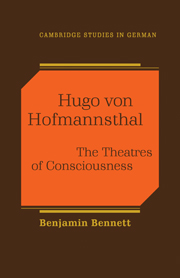Hofmannsthal's development
Published online by Cambridge University Press: 04 August 2010
Summary
“Simple” and “easy” are different concepts. The simplicity of the 1925 version of Der Turm has much in common with the straight-forward philosophical exuberance of Hofmannsthal's earliest writings and jottings; it is the closing of a huge circle, the outcry, “Here I am, Goethe!” But the significance of this closing is measured by the size of the circle, the unending complexities of Hofmannsthal's struggle to come to grips with an actual cultural situation which, difficult enough to begin with, was made more so by the earnest self-critical intensity with which he approached it. I have not raised, and I will not raise, the question of whether a work like Der Turm is valuable or even interesting “in itself.” We do not have that work, or any work, in itself. We have it only against the background of what we know about its author and the conditions of its production, and we cannot unravel this knowledge from the fabric of our perception.
Hofmannsthal's development, then, is in one sense a closed circle. But in another sense it is an accumulation, a progression outward by way of the ideas of the poetic, the social, and the cultural. And at each stage in this progression, Hofmannsthal does his best to incorporate the thought of the earlier stages. His conception of the social focusses upon an idea of “symbol” that is entirely consistent with his youthful theory of poetic language, with the idea that poetry brings to the fore the quality of language as action that supplements and stabilizes the inevitable irony or indirection or paradox in a system of philosophical signs.
- Type
- Chapter
- Information
- Hugo von HofmannsthalThe Theaters of Consciousness, pp. 345 - 350Publisher: Cambridge University PressPrint publication year: 1988



